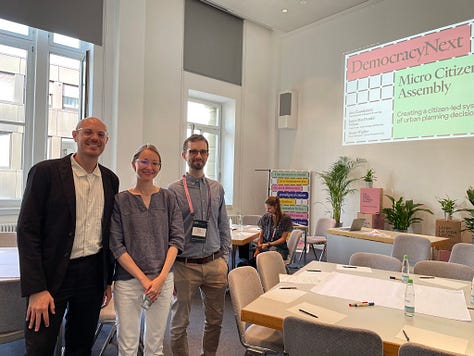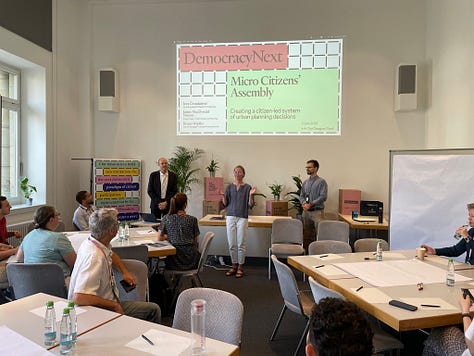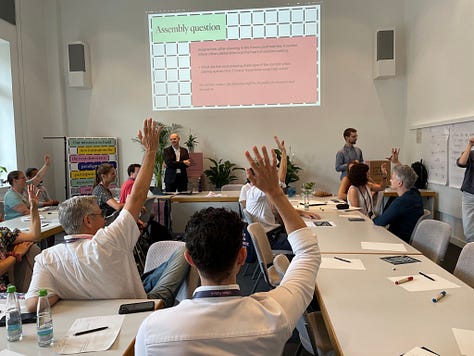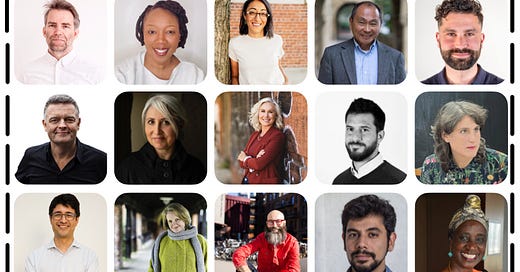Can we democratise city planning? 🏙️
DemocracyNext launches an International Task Force, will put out a call for proposals
Today, we are thrilled to announce DemocracyNext’s International Task Force on Democratising City Planning. Current participation and public engagement processes are not enough to truly give people a chance to shape the cities they live in. Since cities around the world are facing similar issues around housing affordability, vulnerability to climate change, population increase, and rapid urbanisation, people deserve to meaningfully weigh in on how we tackle these complex challenges. In light of this complexity, we see a need to tap into the collective wisdom of the people who inhabit these cities, who are experts and stakeholders of their own communities. We believe that it’s crucial to design a way in which people can regularly play a role in decision-making processes that affect their everyday lives, in a democratic and systemic way.
Since June, DemocracyNext has been meeting with a global group of experts to collaborate together and design this democratic model for city building, one that truly empowers citizens. The Task Force includes a remarkable group of people from various geographic and professional backgrounds including architecture, urban planning, law, deliberative democracy, urban development, and political science. They are working with us to help identify the most common problems faced by decision makers, urban planners, developers, designers, and the public. Furthermore, they will share their experiences in public engagement processes (and the lessons they’ve learned) in order to co-design a new model for citizen participation—based on the principles of citizen deliberation, participation, and sortition.
The members include:
Jan Boelen, Art istic Director, Atelier Luma, France
Ifeoma Ebo, Founder, Creative Urban Alchemy, USA
Zahra Ebrahim, Co-Founder, Monumental Projects, Canada
Francis Fukuyama, Professor, Stanford University, USA
Daniel Fusca, Manager, Public Consultation, Parks, Forestry & Recreation, Canada
Jennifer Keesmaat, CEO, The Keesmaat Group, Canada
Johan Galster, Co-Founder and Partner, We Do Democracy, Denmark
Gabriella Gomez-Mont, Founder, Experimentalista, Mexico/UK
Felipe Rey Salamanca, Founder, iDeemos, Colombia
Flora Samuel, Professor of Architecture, Cambridge University, UK
Jesse Shapins, Head of Urban Strategy & Design, Urban Partners, Denmark
Diego Luna Quintanilla, Senior Project Leader, BUUR Part of Sweco, Belgium
Elisa de los Reyes García, Co-founder of Pezestudio, Spain
Trivik Verma, Assistant Professor in Urban Science & Policy, TU Delft, The Netherlands
Jane Weru, Executive Director and Founding Member of Akiba Mashinani Trust (AMT), Kenya
We have met twice online for some initial discussions, knowledge and experience-sharing and are preparing for an in-person gathering in The Hague, The Netherlands. Between September 10th and 13th, we will work together at the Humanity Hub to build a framework for ongoing, standing, and empowered citizen deliberation for cities around the world to implement. Whilst the exact details of this model will be designed together, we imagine this to be modular and flexible, to allow for contextualisation depending on certain criteria, some of which will include geographic location, existing legal frameworks, and the available resources and capacity of planning departments to adopt deliberative processes.
Once we have a first draft, we will seek further feedback from a wider group of actors and stakeholders before finalising a proposal. This is essential to ensure that we create a model that is informed by as many perspectives as possible.
Finally, later in the Autumn of 2023, we will launch the model and put out a Call for Proposals for cities from around the world to partner with us so we can support them, contextualise, and implement it. The intention is to partner with three cities who will serve as inspiration for other cities around the world to democratise how urban planning and design decisions are made.



As part of this work, DemocracyNext’s Ieva Česnulaitytė and James MacDonald-Nelson ran a micro-Citizens’ Assembly at the Urban Future Conference in Stuttgart, Germany on June 22. This was a gathering of over 2,000 experts, politicians, entrepreneurs, and leaders working to make cities sustainable. Hosted in a different city each year, thousands of “CityChangers” from all over the world came together to share their strategies for transformation. Whilst at the conference, Ieva and James gathered a panel of 15 randomly selected participants (representing 13 different countries) who had a chance to engage in deliberation on ways to democratise city planning. This meant exploring the current challenges facing urban planning departments and how Citizens Assemblies could help solve them. The participants concluded that Citizens’ Assemblies, linked directly to urban planning and design decisions, could help to create bolder solutions for climate adaptation and resilience building, could help to establish long-term solutions that go beyond electoral cycles, and have the power to create a stronger balance of power between people, decision makers, and developers. This feedback is now part of our considerations for designing the model.
If you, or someone you know would like to be part of the wider group of stakeholders to provide feedback and inputs on the model, please reach out to our Project Lead for Urban Design and Planning James MacDonald-Nelson. We’re excited to kick off this unique international effort and, ultimately, to transform urban planning for the benefit of all.
📚 Further reading: In The Online Citizen, Simone Galimberti speaks with Dr. Mohd Azizuddin Mohd Sani, author of Deliberative Democracy in Asia.
Sani argues that deliberative democracy is could help solve systemic problems in Malaysia — and he makes this important point:
First of all, reading it, gives an assurance to those who are weary of deliberative democracy because they see it as primarily a western gimmick, a sort of new Western invention to change the way democracy works, which proves false...
Dr Sani explains instead that deliberation fits well with locally established concepts and traditions that are rooted in principles like musyawarah (deliberation) and muafakat (consensus) that are also found in Indonesia and Brunei.






Fascinating project, and much needed. I would underline the need of a model that opens possibilities for considering alternatives, rather than the "scrutiny" model that consultations operate under in the UK.
I'm delighted to see Jane Weru in this group! From my experience in Kenya, even when citizen input is taken, communicating back to citizens the results of that conversation can be near nonexistent. I'll look forward to your model which hopefully will show real, two-way conversation.